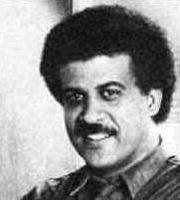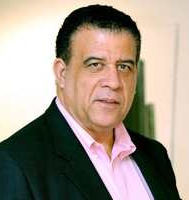|
 |
The Memotech MTX Series |
 |
Geoff Boyd
From his "Linked in" biography
|
 |
 |
 |
|
Then . . .
|
2012 |
and now (2021) |
Geoff Boyd, Bio (April 2012)
Memotech was founded by Geoff Boyd and Robert Branton, the
two met while they were both at Oxford University.
Geoff, who hails from the Caribbean, is a 1970 Commonwealth
Scholar and Physics and Chemistry graduate of Leeds University
with post-graduate and post-doctoral research experience in
Material Science at Oxford University. Leaving academia in the
early eighties he co-founded Memotech, one the UKís leading
first generation PC companies and then led the company that
introduced the worldís first computer interactive Videowall
display systems which included marketing and selling these high
technology display systems into Japan.
In 2010, after over 10 years at NXT plc specializing in New
Business Development, Technology Innovation and Intellectual
Property Licensing, Geoff rekindled his entrepreneurial
activities and founded Silicon Valley based Coleridge+ Design
Associates LLC which has the objective of building a team of
designers, scientists and engineers who specialize in creating
Intellectual Property (IP) by invention and innovation aimed
primarily at the Consumer Electronics (CE) and Green Energy (GE)
markets. At its core is Invention by Design rather than
Invention by Serendipity with the skill and experience to
recognize the difference between a trip to Brighton (the
seaside) and a trip to Mars.
Geoff Boyd
Founder, Managing
Director
Coleridge Design
Associates LLC
2033 Gateway Place,
Suite 500
San Jose, CA
95110.USA
website:
http://www.ColeridgeDesignAssociates.com
+ Geoff's
full name is Geoffrey Arthur Coleridge Boyd - a
coincidence?

2013 - Update
2020 - Geoff's Reflections on the Home
Computers of the 1980s
In September 2020, The Guardian newspaper's website carried an
article titled "The
20 greatest home computers - ranked". Although the Memotech
MTX did not feature in the article,
Geoff commented on the content and argued the case for
Memotech's inclusion in the list.
"This piece fails in many respects but mainly it fails to make
it clear that the rating was UK centric on the one hand and on
the other, to understand and differentiate between the PC
(Personal Computer) and Home Compute genres enabled by 8-bit
microprocessors such as the 8080, 6502 and Z80 in the late
1970s.
The first wave came in the late 70s with the DIY/ hobbyist kit
computers running mainly assembler and in some cases like the
Sinclair ZX80 a Tiny Basic with integer arithmetic. That wave
enabled the UK Home Computer business in 1981 which was led by
the Z80A based ZX81 which should be at Number 1.
It was the first affordable Home Computer with full
floating-point arithmetic and led the revolution allowing the UK
to take pole position in that fledgling industry. The rest is
history, as the say. The ZX81ís main drawback was that it came
with 1k of memory and a membrane keyboard. These deficiencies a
facilitated a thriving add-on industry for memory-packs and
keyboards and nucleated my first tech startup in 1981, Memotech,
Oxford, UK. The other UK Home Computers followed quickly all
trying to get shelf space in WH Smith, Boots and other high
street stores. The ZX81 was sold in USA as the Timex Sinclair
1000 (TS1000) and like the UK at drug stores and retailers where
low cost Timex watches were sold. Many new UK Home Computer
companies were formed to ride that wave. Sinclair fixed the
ZX81ís shortcomings with the ZX Spectrum which should go at Number
2. Acornís BBC Computer should go at Number 3.
I would put our Memotech MTX 512 at Number 4 ;-)
I am particularly peeved at the Acorn BBC Computer which in
effect killed the MTX 512 in the UK not least because of the
promotion of that Home Computer by the BBCís The Computer
Programme which I contend led to unfair competition for Acorn.
Throughout most of Europe, particularly the Nordic countries,
especially Finland, and Germany the MTX 512 beat Acorn hands
down. And from a historical and global perspective, the Memotech
MTX 512, thanks to Hollywood, will be remembered long after most
of those in your list have faded. In the 1984 John Hughes
perennial 1980s teen comedy film 'Weird Science' the MTX 512 was
the computer used to create Kelly LeBrock by the teen
protagonists. And only last year it was remembered in the Weird
Science Episode of The Goldbergs. Weird Science, Like Ferris
Buellers Day Off and other 1980ís John Hughes teen comedies are
shown here in the USA several times a year. And the Goldbergs is
now in syndication. This means that history will be perplexed by
this list.
By the beginning to mid 1984 the Home Computer business all but
died when the market saturated and within a couple of years all
the UK Home Computer companies either went bust or were sold to
larger companies. Creatives SoundBlaster didnít appear until
1987 and the business oriented IBM PC and I would argue that the
PC clones didnít become Home Computers as such until after then.
In fact, I would say that the term Home Computer disappeared
into the Personal Computer genre sometime well before 1987.
Amstrad PC 464ís Home Computer success is almost entirely due to
the demise of the competition and Amstradís fortuitous ability
to buy key microprocessor and memory components at a fraction of
the price that those of us paid up to 1983/4.
By his photo I would say that the author was probably too
young to appreciate the significance of that golden 1981 to 1985
period in the UK and had this list been compiled from
contemporaneous computer magazines and trade show reports then
the list would be more accurate.
Geoff Boyd, San Jose, CA"
2021 - Update
Geoff Boyd, Bio (September 2021)
Geoff, who hails from the Caribbean, is a 1970 Commonwealth
Scholar and Physics and Chemistry graduate of Leeds University
with post-graduate and post-doctoral research experience in
Material Science at Oxford University. Leaving academia in the
early eighties he co-founded Memotech, one the UK's leading
first-generation PC companies ( http://lnkd.in/fneVsJ ). And
then founded Memotech Videowalls with the world's first computer
interactive Videowall display systems, dominating the market for
Videowall electronic control systems for a decade through to the
mid-nineties. In 2010, after a 10 year spell at NXT plc,
Cambridge, UK, where he specialized in New Business Development,
Technology Innovation and Intellectual Property Licensing, Geoff
rekindled his entrepreneurial activities and founded Silicon
Valley based IP Development and Licensing company Coleridge
Design Associates LLC which, over a ten year period, has built
up a powerful IP portfolio for new transducers, motors and
sensors which leverage advances in material science, electronics
and IT.
Anchoring Coleridgeís physical IP portfolio are two breakthrough
patented inventions by Geoff; on the one hand, the Active Magnet
Loudspeaker and on the other the DC Induction Motor (DCIM).
Driven by sustainability to eliminate Rare Earth permanent
magnets, both inventions leverage advanced materials in the form
of insulated iron Soft Magnetic Composites (SMCs), efficient
power electronics using wide-bandgap semiconductors, and
computational digital signal processing.
In 2020 Geoff launched Memotech
Ai which picked up his work 20 years ago on Binomial Matrix
Transforms, used then for efficient digital video lossless
compression hardware, but now, is used for new Domain Specific
Architectures for highly efficient ML/Ai semiconductor
integrated circuits.

Geoff Boyd
Managing Director
Coleridge Design Associates LLC
San Jose, CA. USA
e-mail:
Geoff@ColeridgeDesignAssociates.com
|